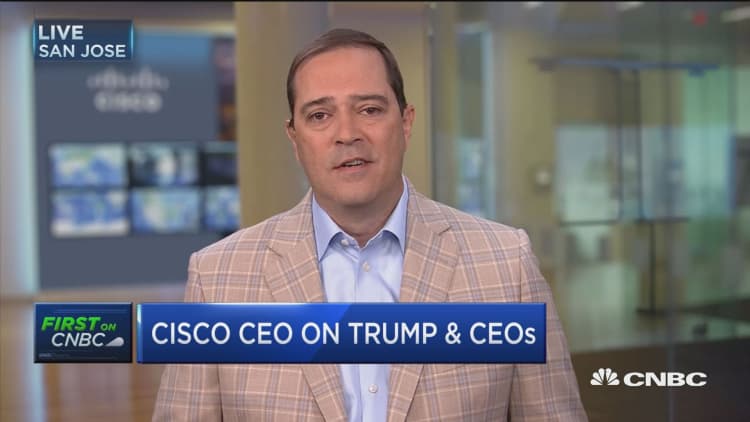When Chuck Robbins was promoted to CEO of Cisco in 2015, the company's technology was in danger of losing relevance.
When Google named Diane Greene as head of its cloud division that same year, her unit was desperate to close the gap with Amazon Web Services.
Two years later, Robbins and Greene are teaming up to develop and sell cloud technology and services in a whole new way and to take on AWS.
On Wednesday, Cisco and Google announced a partnership that will combine Google's expertise in building massive data centers and open source software with Cisco's global salesforce, customer support and security.
Cloud infrastructure, the technology that allows businesses to offload their computing and storage needs and access their data from anywhere, has become a huge and fast growing market — and Amazon dominates it. The company's AWS business got started in 2006 and is now generating over $4 billion in sales a quarter.
AWS controls 34 percent of the market, according to Synergy Research Group. Google is a distant fourth with around 5 percent of the market, behind AWS, Microsoft, and IBM.
But the cloud is maturing, creating new openings for competitors.
In particular, big companies with thousands of employees and legacy servers aren't dumping all of their data into AWS. Instead, they often do new projects in the cloud and let developers test and build apps there, while leaving core data in their own data centers.
This is particularly true for complicated and heavily regulated businesses like hospitals and banks — exactly the kinds of businesses an enterprise upstart like Google wants to reach.
Coming in 2018
"This whole cloud phenomenon is gaining steam pretty rapidly, and it's really become a strategic imperative for people," Greene told CNBC.
"But it just can't happen that fast. It's a lot to take all your on-premise data centers to the cloud and not everything will necessarily move."
As part of the agreement, Google and Cisco are co-developing a hybrid offering that will bring some of Google's tools for working with cloud services to enterprises that aren't ready to go all-in on the cloud. Cisco will provide security and support as well as computer networking.
A winning cloud strategy is also critical for Cisco. There's not much growth left in selling hardware like routers and switches, which have generated the bulk of Cisco's revenue, and its software products for communications and collaboration operate in highly competitive markets.
But Cisco has relationships with the largest enterprises and governments around the world. Because those customers demand modern tools for application development and for running machine learning workloads, Cisco's ability to offer Google's services may be a way to keep them from fleeing.

"We've listened to our customers," Robbins told CNBC. "They're looking for cloud speed and scale and agility, but they want the flexibility of running applications in private data centers as well as in public clouds."
The Google-Cisco offering will be available for early customers in the first half of 2018 and will hit the broader market in the second half of the year.
Greene highlighted Kubernetes and Istio as two open-source products that will have particular resonance with Cisco customers. Kubernetes was developed by Google, and allows developers to build and deploy apps in digital containers. Istio was created by Google, IBM and ride-hailing start-up Lyft and is used for managing microservices, or small software programs that are stitched together to perform a variety of functions. Both technologies help programmers build software more quickly and flexibly, and make it more reliable and less likely to crash.
Google and Cisco aren't divulging how the revenue split will work. And Robbins said there's nothing in the deal that precludes Cisco from forging similar partnerships with other cloud providers, should the opportunity arise.
With AWS still growing at almost 40 percent a year, Google is eager to show the market where it has advantages over its rivals.
"Customers are excited about this when we explain it to them," Greene said. "It lets them see where we're going and how we're going to do it."
-- CNBC's Josh Lipton contributed to this report.


